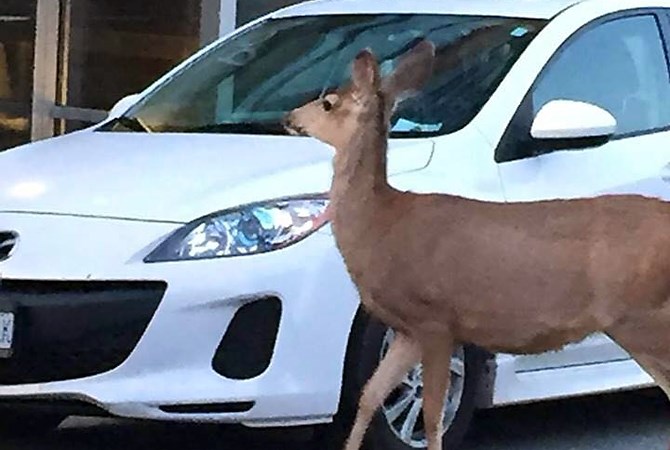
Deer and cars are in growing conflict on the Westside.
Image Credit: FACEBOOK/Melonie Dodaro
January 09, 2019 - 4:00 PM
KELOWNA - Conflicts are down with bears on the Westside but there are growing problems with deer.
Those are the key findings of a WildSafeBC report that went to West Kelowna city council yesterday, Jan. 8.
“The best way to reduce conflict is to prevent them from becoming habituated and entering the urban areas so we do recommend people think about fencing and, for sure, never feed them,” WildSafeBC provincial coordinator Vanessa Isnardy told iNFOnews.ca.
“It’s a hard thing to enjoy wildlife but not do harm by feeding them," she added. "People think they’re doing the right thing in helping them out but don’t realize, in the long term, it actually increases collisions with cars because they’re crossing the roads.”
The report went to council for information purposes but was not commented on any councillors.
It did not provide exact numbers of deer conflicts but does state that 88 per cent are calls about “injured, distressed or dead deer.”
The stats show an increase from about 50 reports in 2016 to more than 100 in 2018. The number of black bear complaints from Nov. 20, 2017 to Nov. 20, 2018 was down to less than half what was reported in the previous two years.
There were more than 250 bear reports in each of 2016 and 2017 compared to less than 100 in 2018.
“This trend was observed in many other communities across the province this year and may be a result of the good growing conditions for natural foods and their availability to bears in the wild,” states the report, written by coordinator Meg Bjordal. “It is also possible that increased education provided by the WildSafeBC program has led to changes in behaviour which has led to the better management of unnatural attractants.”
Garbage still accounts for 71 per cent of the bear attractants on the Westside. Bird feeders accounted for seven per cent and compost for six per cent. Gardens and fruit trees combined accounted for another six per cent.
Again, providing food sources for bears is the worst thing to do.
“We do know that natural foods are very important for bears,” Isnardy said. “If there are good natural food sources they can graze and not come into conflict. Wildlife is always weighing the best reward for the lowest risk. They don’t want to be in conflict. They don’t want to put themselves at risk.”
Isnardy said that 2018 seemed to have a damper spring so growth was more lush throughout the year, but she had no scientific evidence to prove that connection.
Bear conflicts happen mostly in the fall as they fatten for winter. Berries are their preferred food, she said.
“There’s a lot of calories in berries,” Isnardy said. “There are some interesting studies about food preferences in Alaska. They found that bears will actually favour berry crops over salmon.”
This is WildSafeBC’s third year on the Westside. It held eight public education events in 2018 that attracted about 750 people.
The organization used to be known as Bear Aware and is available to communities upon application and depending on funding, most of which comes from the B.C. Conservation Foundation and Ministry of Environment.
It’s too early in the application process to know if a WildSafeBC coordinator will be funded on the Westside this year, Isnardy said. WildSafeBC did not have a coordinator on the east side of Okanagan Lake last year.
WildsafeBC is described on its website as “a program designed to reduce human-wildlife conflict through education, innovation and cooperation. It has evolved out of the highly successful Bear Aware program and is owned and delivered by the British Columbia Conservation Foundation.”
To contact a reporter for this story, email Rob Munro or call 250-808-0143 or email the editor. You can also submit photos, videos or news tips to the newsroom and be entered to win a monthly prize draw.
We welcome your comments and opinions on our stories but play nice. We won't censor or delete comments unless they contain off-topic statements or links, unnecessary vulgarity, false facts, spam or obviously fake profiles. If you have any concerns about what you see in comments, email the editor in the link above.
News from © iNFOnews, 2019